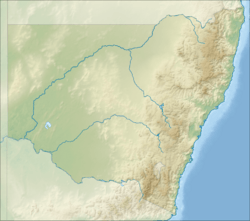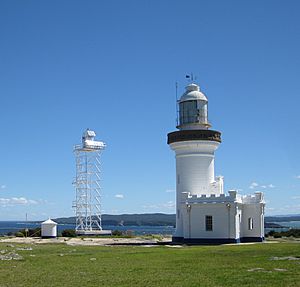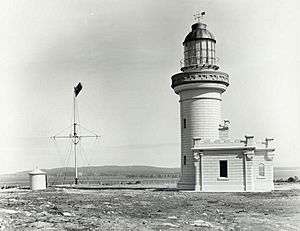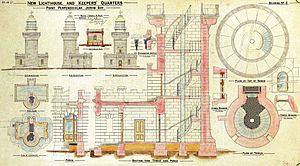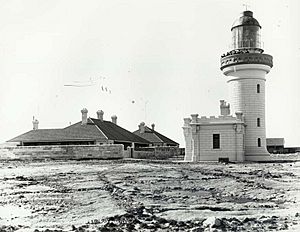Point Perpendicular Light facts for kids
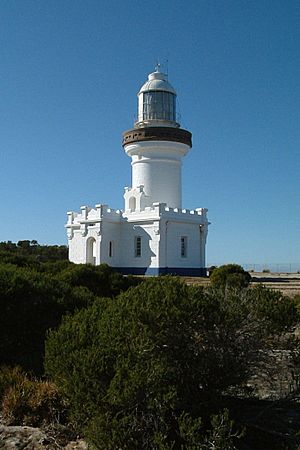 |
|
| Point Perpendicular Lighthouse | |
|
|
|
| Location | Point Perpendicular New South Wales Australia |
|---|---|
| Coordinates | 35°05′38″S 150°48′16″E / 35.09393°S 150.80458°E |
| Year first constructed | 1899 |
| Automated | 1993 |
| Deactivated | 1993 |
| Foundation | solid rock, covered flat concrete base |
| Construction | concrete blocks |
| Tower shape | cylindrical tower with balcony and lantern |
| Markings / pattern | white tower, black gallery rail |
| Height | 304 feet (93 m) |
| Focal height | 70 feet (21 m) |
| Original lens | 1st order Fresnel lens |
| Intensity | 1,200,000 cd |
| Range | 26 nautical miles (48 km) |
| Characteristic | Gr (3) W 20s |
| Admiralty number | K2588 |
| NGA number | 6504 |
| ARLHS number | AUS-137 |
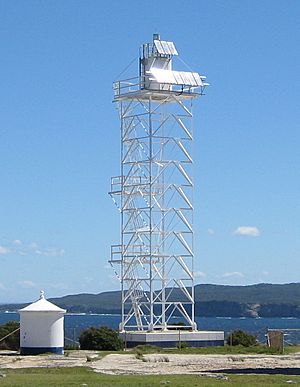 |
|
| Skeletal tower that replaced Point Perpendicular Lighthouse | |
| Location | Point Perpendicular New South Wales Australia |
|---|---|
| Coordinates | 35°05′39″S 150°48′16″E / 35.09423°S 150.80456°E |
| Year first constructed | 1993 |
| Construction | skeletal tower |
| Tower shape | square tower with platform and light |
| Markings / pattern | white tower |
| Height | 62 feet (19 m) |
| Focal height | 311 feet (95 m) |
| Range | 19 nautical miles (35 km) |
| Characteristic | Fl W 10s. |
| Admiralty number | K2588 |
| NGA number | 111-6504 |
| ARLHS number | AUS-137 |
The Point Perpendicular Light is a famous lighthouse located on Point Perpendicular in New South Wales, Australia. This point is at the southern tip of the Beecroft Peninsula. The lighthouse helps guide ships entering Jervis Bay from the north.
The original lighthouse was built in 1899 and worked until 1993. It's still standing today! People believe it was the first lighthouse in New South Wales made from special precast concrete blocks. In 1993, a new, modern tower with a light replaced the old one. The new tower is a skeletal (frame-like) structure and is still active.
Contents
Building the Lighthouse
The Point Perpendicular Lighthouse was built to replace an older one called Cape St George Lighthouse. That lighthouse wasn't in the best spot for guiding ships into Jervis Bay. People knew this problem existed since the old lighthouse was built in 1860.
In 1883, Point Perpendicular was chosen as the perfect new location. The plans for the lighthouse were approved in 1897. Charles Assinder Harding designed it. He also designed other famous lighthouses like Cape Byron Light and Norah Head Light.
Construction started in September 1897. Most building materials arrived by ship at Bindijine Wharf, about 5 miles (8 km) away. From there, horses and carts carried everything to the lighthouse site. The light was first turned on for ships on May 1, 1899.
How the Light Changed Over Time
When it first started, the Point Perpendicular Light used a special kerosene lamp. It was very bright, about 100,000 candela (a measure of light intensity). Ships could see its light from about 20.5 miles (33 km) away. The lighthouse had a huge Fresnel lens that weighed 33 tons! This lens is still inside the lighthouse today.
The light's power was increased over the years. In 1909, it became 222,000 candela. Then in 1923, it was upgraded again to 316,000 candela.
In 1964, the lighthouse became electric. Two diesel engines provided the power for the light.
The New Light Tower
On July 5, 1993, the old lighthouse was turned off. A new, fully automatic, solar-powered lamp took its place. This new lamp sits on top of a tall, skeletal (frame-like) tower. The new light is still active today.
The future of the historic lighthouse is not fully decided. It's a very old and important building. Sometimes, access to the area is limited because the land is used by the Department of Defence.
Lighthouse Keepers
Lighthouse keepers were people who lived at the lighthouse and made sure the light was working. The first head keeper at Point Perpendicular was William Parker. His assistants were William Simpson and Arthur Bailey. Arthur Bailey's father was also a lighthouse keeper at the old Cape St George Lighthouse.
The last keeper of the original Point Perpendicular Light was John Hampson.
Special Re-lightings
The old lighthouse light has been turned on again a few times for special events!
- 100th Birthday: On May 1, 1999, the lighthouse turned 100 years old. Celebrations happened in October 1999 as part of the Currarong Seafare Festival. There were tours, naval displays, and activities for kids. The lighthouse light was turned on from dusk until 11 PM, and the new light was turned off during this time.
- International Lighthouse Weekend: The light was also turned on again on August 20-21, 2005, for the International Lighthouse & Lightship Weekend.
Lighthouse Buildings
The main lighthouse tower is made from concrete blocks. These blocks were made on the ground, then lifted into place. This building method was easier because it didn't need lots of scaffolding. The blocks were different sizes, but most were about 12 inches (30 cm) high.
The tower is round, about 11 feet 9 inches (3.58 m) wide inside. It's 44 feet (13.4 m) tall up to the balcony. Inside, it has three floors with black and white tiled floors. Stairs with brass handrails connect the floors. At the very top, there's a balcony with black railings.
The tower is painted white with a blue stripe at the bottom. Above the main door, there's a glass window with a picture of a Waratah. This is the state flower of New South Wales. The window also shows the year the lighthouse was built.
Next to the tower is a one-story house where the lighthouse keeper lived. It's made from the same concrete blocks and painted white with a blue stripe. The keepers' main homes were about 70 feet (21 m) south of the lighthouse. They had underground tanks to collect rainwater for drinking and washing.
There was also a building that used to be a stable for horses. Later, it was used to hold the generators that powered the light.
Visiting the Site
The Australian Maritime Safety Authority manages the light itself. However, the Department of Defence looks after the land where the lighthouse stands. They use the area for gunnery practice about 100 days a year. On these days, public access to the site is limited for safety reasons.
 | May Edward Chinn |
 | Rebecca Cole |
 | Alexa Canady |
 | Dorothy Lavinia Brown |


